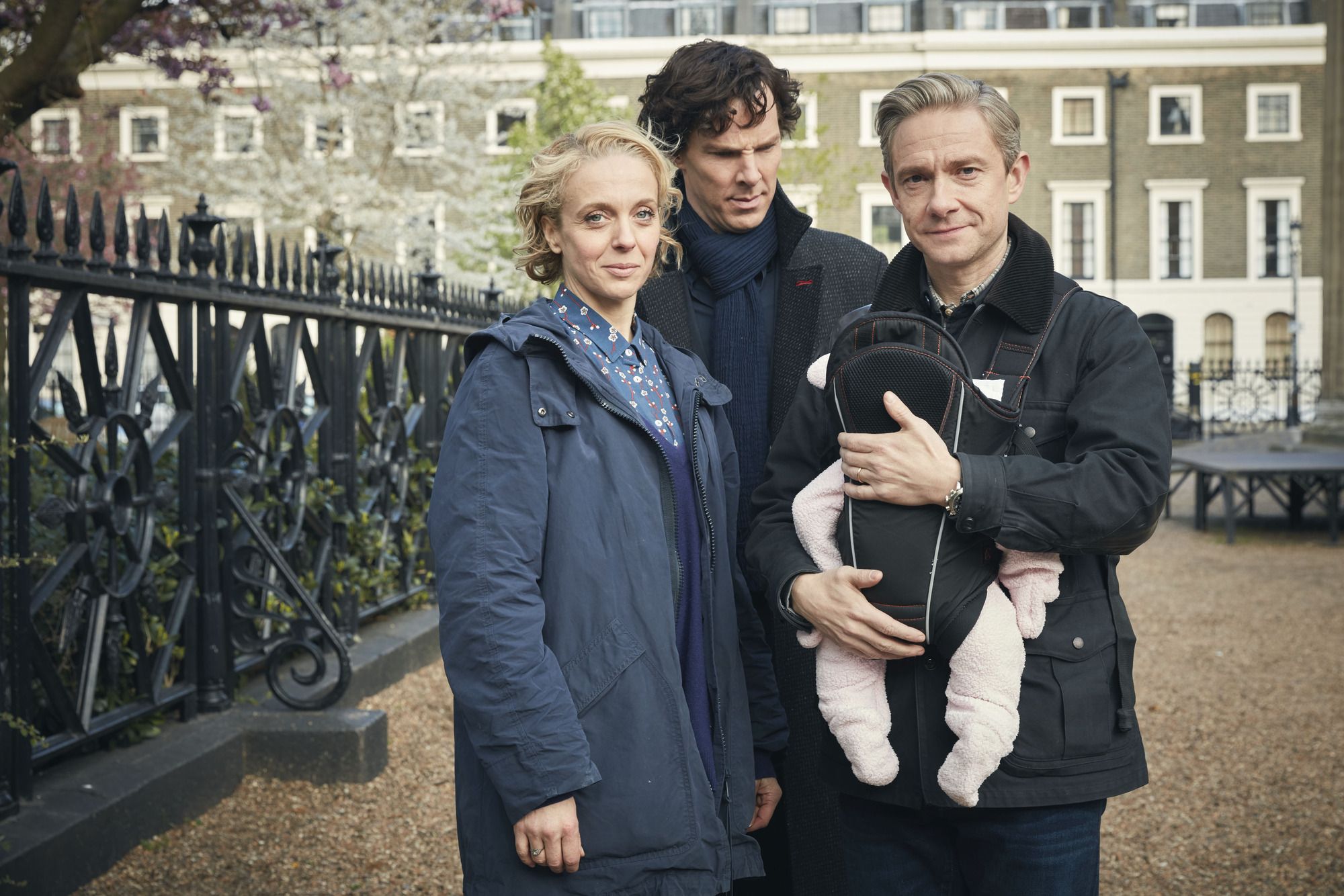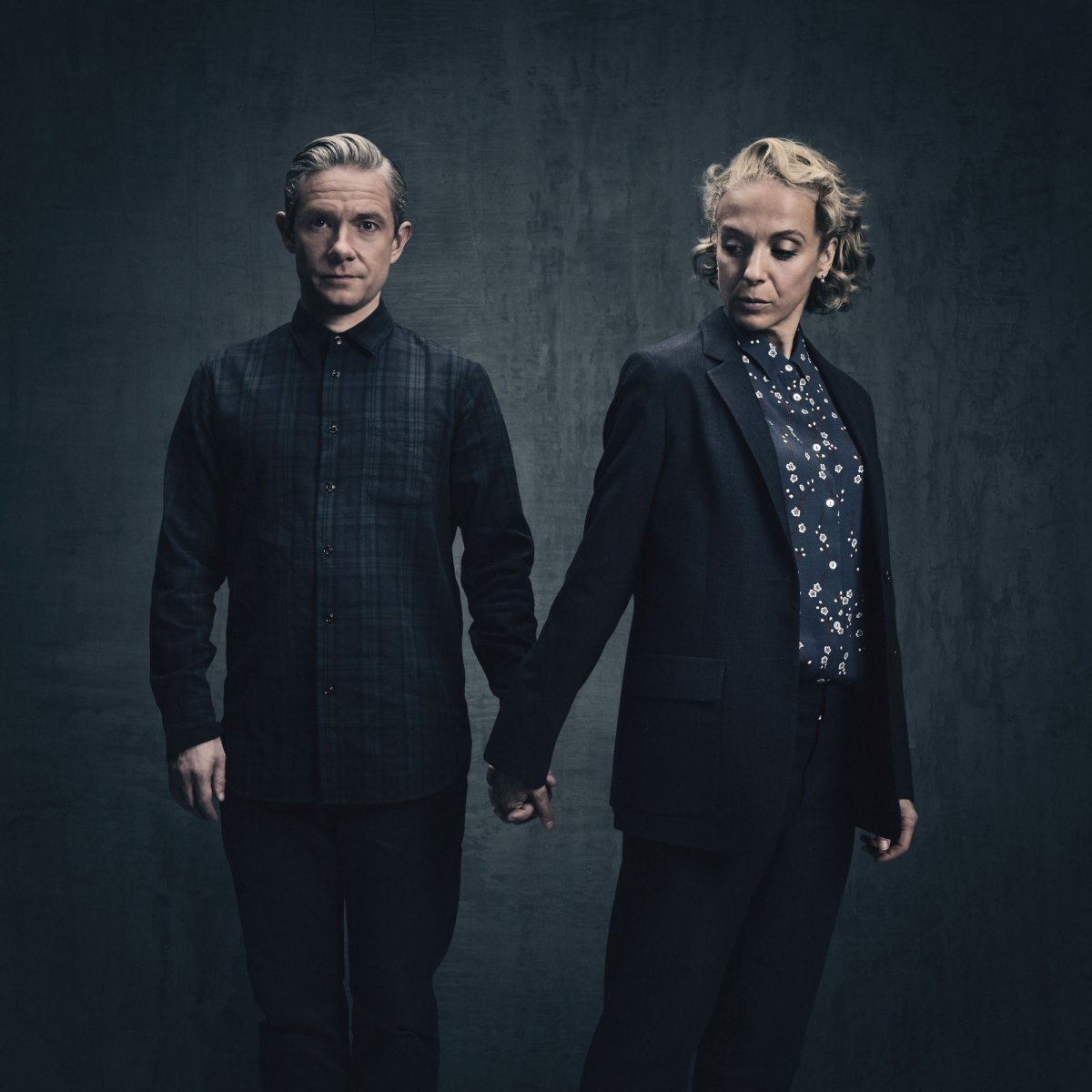
The year has only just begun but we already have our first contender for 2017's most heartbreaking television moment. [Warning: This post contains multiple spoilers]
Sunday's Sherlock season four premiere delivered a seismic blow to fans of John and Mary Watson—played by Martin Freeman and Amanda Abbington—when Mary died in her husband's arms after being shot by unlikely villain Vivian Norbury, played by veteran British actor Marcia Warren.
The dramatic conclusion to "The Six Thatchers" came after co-creators Steven Moffat and Mark Gatiss spent much of the 90-minute episode giving viewers a glimpse of the couple's new family life as they adjusted to parenthood. By the episode's end, however, poor baby Rosamund was left with just one parent.
Abbington joined Sherlock's core cast, alongside her former real-life partner Freeman and Benedict Cumberbatch, in season three. The death of her character was expected to come at some point—as foretold by Arthur Conan Doyle's Sherlock Holmes stories. But, Moffat and Gatiss tell Newsweek, Mary's death so early on in the new season adds an element of surprise to the "120-year-old spoiler," as Moffat dubs it.
While Sherlock is famous for its red herrings, Moffat says it was always the intention to follow Doyle's narrative and kill Mary, rather than swerve fans and keep her alive. "My problem with that is: does Mary then subside into nothing, as the wife that lets John out to play?" he explains. "In the end, Doyle discovered that you always want to cleave back to the two boys in Baker Street. So it's better to have a great part for Mary, give her a heroic role, and then get on with what is going to be the format."
Related: 'Sherlock' Creators Talk Season 4 and Beyond
Mary's final moments were indeed heroic as she jumped in front of a bullet intended for Sherlock, declaring herself and Sherlock "even" after shooting him in season three. The fallout from Mary's death will set the tone for episodes 2 and 3, says Gatiss. Sunday's episode concluded with Watson blaming Sherlock for his wife's death and refusing to see him, potentially ending their friendship.
A further unexpected twist added another layer of heartbreak: Viewers saw that before Mary's death, Watson had been texting another woman he had met on the bus earlier in the episode. This morally questionable behavior threatens to cause uproar among Sherlock's devoted Tumblr fan base, whose adoration for the dependable Watson—and, by extension, Freeman—has thus far been unwavering.
Newsweek spoke to Abbington in late December about Mary's death, the impact of Watson's text affair and whether we'll see her on Sherlock again.
Newsweek: This is going to cause a New Year's meltdown when it airs…
Abbington: I think so. We always knew Mary wasn't going to be around forever, but I liked the dramatic way she leaves—she saved Sherlock's life and it's payback for what she did to him.
How far in advance did Moffat and Gatiss tell you about the death?
I think they came to us at the beginning of the year. They said to me, "This is where she dies, in episode 1." And then they said it was going to be quite dramatic.
Mark then said a couple of months later: "I'm toying with the idea of her just being hit by a bus and being quite arbitrary."
Her death scene is so wonderfully over-the-top: the big showdown with the villain in an aquarium—the dark, moody lighting. That's such a Bond-esque setting. How fun was that?
I loved the idea of it being in an aquarium. I loved the imagery of the sharks [in the background], that they had to keep moving all the time. There's a beautiful poetic undertone of what the characters are involved in: the underworld, mystery and danger.
It felt very larger-than-life but I like that. Sherlock is not a naturalistic show. It's very theatrical and that's what people love about it. We wanted it to be larger-than-life. I'm hoping we pulled it off. It's a brilliant pastiche, Mary dying in John's arms...it's beautifully melodramatic.
What was it like filming that big death scene?
I remember speaking to Andrew Scott [deceased villain Moriarty], we met up during filming, and he said: "The thing is with Sherlock, you never leave." That's the beauty of Sherlock—they can cherry-pick the best bits and flashback, and so you never truly leave the family.
That day's filming felt like her time had come. It was quite sad. That was her story in terms of her life...and not flashbacks or whatever might happen.
Was it quite emotional playing Mary dying in Watson's arms, given that Martin is your real-life partner?
He's not actually. We split up back in March. We split up before the filming started. But it was all very amicable. We're best mates and still very close.
It was hard doing that. It is horrible when you see someone you love, even in a dramatic sense, dying. He found it very difficult to do that. The emotion that came out...for both of us it came from a place of honesty. We were both very emotional that day. It was a great scene to film but it was exhausting. I had to keep doing it for different takes so you have to conserve your tears and your energy because it's exhausting crying all the time. It was a rollercoaster of emotions that day.

Were you pleased with how the death turned out in the final episode?
What I love is you think it's about this case about the six Thatchers and the Borgia Pearl, and then it does a complete left-turn and becomes Mary's story. You're blindsided by it. I was pleased it had those obtuse turns and you find out it's about her, and the three of them, actually.
Then the priority story is about John and Sherlock and where do they go from there?
As well as Mary's death, there's this second huge gut-punch of Watson texting another woman. How do you think fans will react?
You realize that people are flawed and aren't perfect. We paint these pictures of John and Mary being this happy couple—but of course you're not happy all the time and of course life gets in the way of relationships. I love that they show him as not a perfect person, because he isn't, and neither is she, or Sherlock, or Molly. None of them are. No one's painted as an out-and-out hero. You're led to believe John is this loyal, steadfast, amazing husband and father, but, actually, of course he's not. Life happens. And there are interesting people out there and, if you allow it, your head gets turned.
You see the payoff of that in the second and third episodes. It all beautifully ties up at the end of the fourth season.
Moffat and Gatiss teased fans that this is a "story about to reach its climax." You get a sense of that with Mary's death, and Sherlock and Watson's friendship crumbling. Does this feel like the end to you?
In my heart, no. No one ever knows if we're going to do more. It depends if everybody is around to do it. When you see how this [season] finishes, you go, "Oh, OK, maybe we leave this for a little bit. Maybe we leave this to settle and see what happens in a couple of years."
Sherlock airs Sundays, BBC One in U.K., PBS in U.S.
Uncommon Knowledge
Newsweek is committed to challenging conventional wisdom and finding connections in the search for common ground.
Newsweek is committed to challenging conventional wisdom and finding connections in the search for common ground.
About the writer
To read how Newsweek uses AI as a newsroom tool, Click here.








